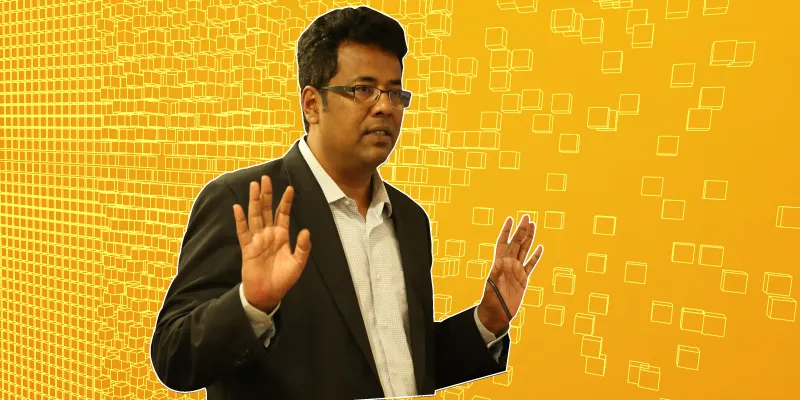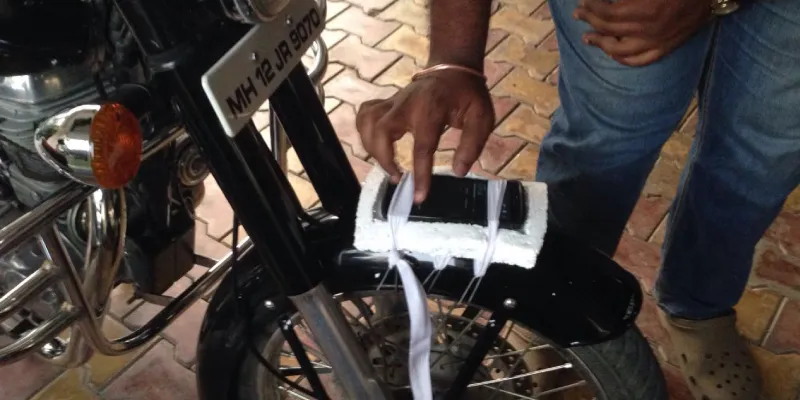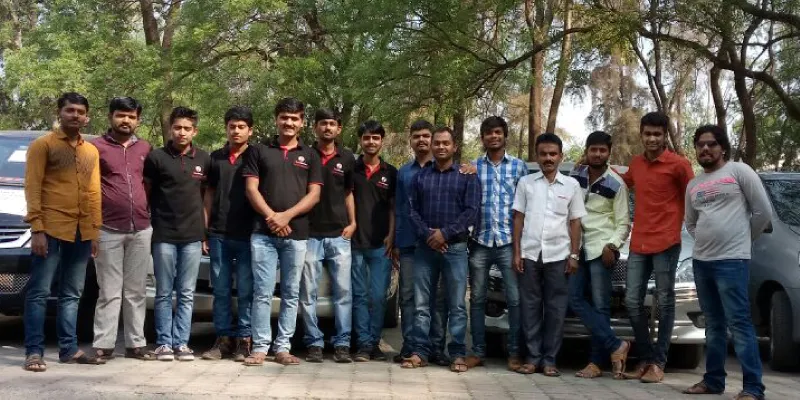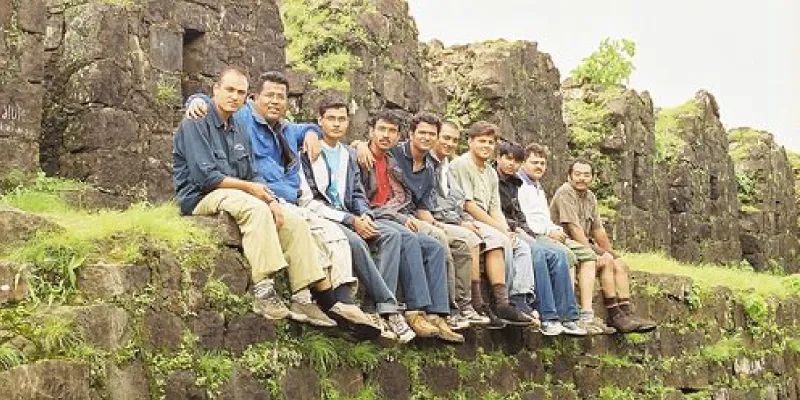Meet three-time entrepreneur from Aurangabad who survived 9/11 and a failed startup
In these tough times of sustaining a business without any lineage, let alone start one, ordinary stories like Ranjeet Deshmukh’s take on extraordinary tones just by the sheer grit and passion they display.
Ranjeet Deshmukh is a survivor. He survived the World Trade Centre terrorist attacks of 9/11, and a failed startup. He attributes escaping one disaster to fate, but takes the second one on the chin.
Now, into his third startup, 43-year-old Ranjeet has that wry smile about him that comes from having seen both success and failure (more failure, actually).

“I used to drive a Skoda (petrol-driven) during the successful reign of my first startup, I came down to a second-hand Maruti 800 when my second startup crashed,” he says matter of factly -- a comment that always draws laughter from people around him.
It is important to understand what makes entrepreneurs like Ranjeet tick. In these tough times of sustaining a business without any lineage, let alone start one, ordinary stories like Ranjeet’s take on extraordinary tones just by the sheer grit and passion they display.
Road is the journey
After nearly 18 years, Ranjeet is today comfortable in the skin of an entrepreneur. His Pune-based startup RoadBounce provides technology for digital road surveys that help governments and local administrations save up to 50 percent of the cost on road repair works.

“We reduce road accidents by reporting dangerous combinations of traffic patterns, and poor road conditions,” he says, adding, “Unlike the instruments used today for these types of surveys, RoadBounce provides accurate GPS mapping of roads, and a GIS system to view road condition remotely, without any capital investment.”
He is already working with local administrations in Pune and Aurangabad, and has been travelling around the country to talk to other governments. “It is an understatement that the condition of our roads is bad,” he says. Ranjeet adds his startup can survey an entire state in weeks, and get real-time data.
Bumpy ride
Even after so many years of being an entrepreneur, Ranjeet prefers to bootstrap.
“My previous two startups were mostly funded by myself, friends and family, institutional funding and angel investors. RoadBounce is funded mostly by myself, a loan on my property and my mother has given me a personal loan.”

RoadBounce was part of a US government incubator, Nexus, along with three other companies, Clensta, WCP, and WhiteCub, in 2017.
Last year, the startup did a business of Rs 1.5 crore, and still has orders worth Rs 3 crore in the pipeline.
“I am back to a better car now. This time, a Volkswagen petrol car, but I hope to have a better car in the future,” he says with a glint in his eyes.
Ranjeet may have chosen the car metaphor to describe his rise and fall and rise again in his startup journey, but make no mistake he is not a material man.
Startup’s lottery ticket
Addressing a group of aspiring entrepreneurs in Aurangabad recently, he gave the example of the man who prayed to God to shower him with millions of dollars as lottery prize money, only to be told to at least buy the damn ticket first! He told them,
“In your journey as entrepreneurs, you will have to collect many such pieces of lottery tickets.”
Ranjeet’s first lottery ticket was when he escaped the attacks at the twin towers in New York. “Sometimes bad habits like being late to the office can save you,” he says in his stoic way. Ranjeet was on the subway to the World Trade Centre when tragedy struck.
“I was working with NASDAQ at the moment, when WTC tower collapsed in the unfortunate event. This was a trigger for me to move back to India,” he says.
He had met folks from ShipNow, an American logistics company, that was looking to have an offshore center. They wanted to hire him as the software architect and principal developer for their flagship product DIServer.
ALSO READ: Why this serial innovator refuses to give up even after 18 years of struggle
“This is where I convinced them to have an offshore center in Aurangabad, where I could move back with my wife and own the responsibility of complete development and support of the product. This is how I ended up owing the India subsidiary of my first startup,” adds Ranjeet.
He started the Aurangabad centre of ShipNow in 2002, developing products for logistics/supply chain industry. He later successfully exited, after it was acquired by competitor Kewill in 2004.
The winning trait
Ranjeet’s second startup was ServiceWing Healthcare, which he started in 2005. “We launched our first pilot with Veterans Association in San Diego in 2011, where we got selected under Veterans Association Innovation Awards for our technology,” he says.
He, however, shut ServiceWing due to lack of business by 2013, nearly nine years after he started it.
They say investors bet on the entrepreneur and not the idea. If you pardon the analogy, Ranjeet is surely a winning horse.
For someone who is not a computer engineer, Ranjeet, besides being the founder of his tech company RoadBounce, is also its CTO.
“I graduated from SB College in Aurangabad. Marks acche nahi the (I did not score too well), so I was not considered the IIT or IIM material.”
A BSc graduate, Ranjeet, however, had a sound understanding of technology and liked coding. He went on to do his Masters in Computer Management from Pune, but says he did not learn anything there. He then managed to get an entry in C-DAC, but was cautioned that since he was not an engineer, he might not land a good enough job.
We know by now, Ranjeet did well by listening to his inner voice, than all the buts and ifs of the world.
Come rain or shine
A particular anecdote related to his first startup that he shared with aspiring entrepreneurs at a recent meetup in Aurangabad is worth a retell.

After he took over the India subsidiary of ShipNow and wrote the first code for the product, he successfully expanded his team from one man to a 120-member team, and was also outsourcing some work to IT companies in Pune.
“We were doing product development and professional services/support. Once, we decided to take a break and went on a team picnic to Chikhaldara, a scenic spot near Aurangabad,” he says. That weekend, there was a record rainfall and the group was stranded. “On Monday, our customers would be online, we had a lot of deliveries to be made and code to be written,” he narrates.
Ranjeet decided to hold a meeting at the railway platform, and divided his team into two groups -- one would try and get back to the office using whatever mode of transport they get, and the other he took with him to a nearby town hunting for a cyber cafe.
He found a cyber cafe that had about 20 machines, made a deal with them, cleaned out their software, installed his own along with anti-virus and so, was back in business.
“From 8 pm to 8 am, we were live and in the morning the other group (which by then had reached Aurangabad) took over,” he relates, adding, “These are challenges that all entrepreneurs face and those who want to start out should be prepared for.”
Recalling his milestones, Ranjeet says with a laugh,
“My first startup was a great success and I sold it to our competitors and made some decent money. By then, I was an established startup guy. I started my second startup, but it failed miserably. It was so miserable that I do not even want to remember it.”
The jackpot
It’s worth noting the advice he gave to the gathered youngsters. “Typically, tech startups do not understand the business part. I learned that late. Ideally, if you are starting out, have a co-founder with a complimentary skill. If you are a single guy, you will have double the challenges,” he says. Since he was the single founder, he learnt to hire right.
“The first slide (while presenting your pitch) should always be about what problem you are solving, which you have validated for the customer who will actually pay for it. For my first startup we had it, for my second, we did not.”
Today, backed by this wisdom, Ranjeet may be on his way to winning the lottery with his third startup. He has done well to preserve the bits and parts, and see it become his whole ticket to glory.







